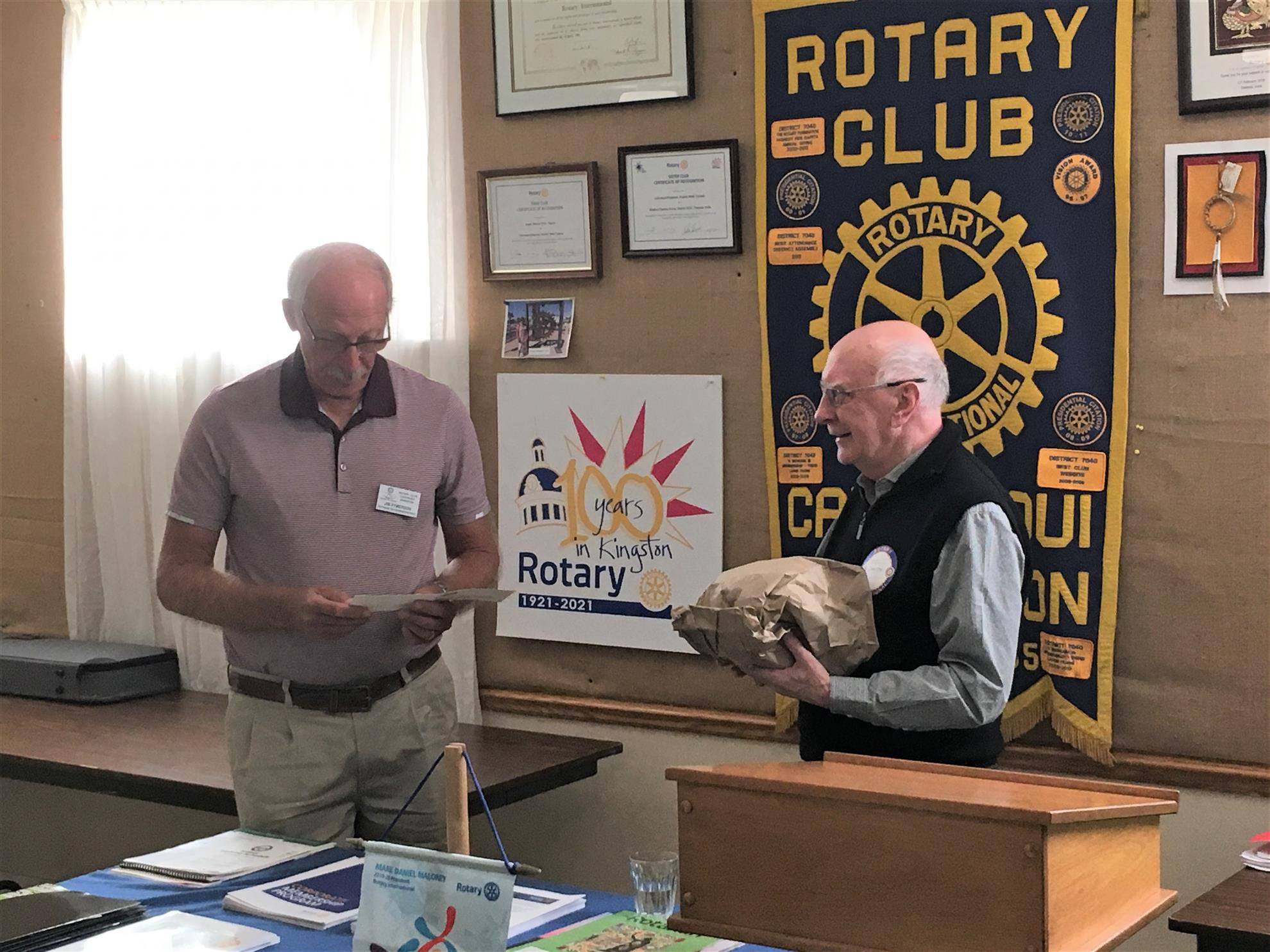Guest speaker Mac Johnston, newspaper reporter for 40 years was introduced today by John Farrow
Mac talked about his background; born on a farm in Hastings County, Mac was schooled in Belleville and attended Kemptville Agricultural College. While working a summer job as manager of a retail store in Madoc, Mac dropped into the Quinte Hotel and met a former teacher who told him about a sports news reporter job with the Belleville Intelligencer. The teacher felt so strongly the Mac should apply for the job that he had made an appointment for an interview the next day! Mac got the job, which entailed a 5:30 a.m. start time and many split shifts. Next, the Trentonian City Desk position came open, a great opportunity to show Mac's initiative. Mac connected with City Clerk, learned about city budgets and got involved in reporting on city council. This offered Mac an opportunity to explore other types of reporting, like some agricultural reporting, and writing a story about a man named “Charlie Brown”—what it was like to have a famous name. He then started doing stories on local people with famous names—Pierre Trudeau, Maurice Richard, etc., which earned him an award. Mac and his wife raised a family in Trenton, then got a job in Cornwall with the Standard Freeholder, which was in a downturn cycle, with only four, inexperienced reporters; he had politics, then took on school board reporting. But his wife, from Galt, was not happy there. When visiting her home, he saw ad for working at the Guelph Daily Mercury. He got the job, but only after the manager checked whether they could steal him from one Thompson paper to another. In Guelp there were four reporters and three bureaus, linked by teletype (this was 1971). Then in 1972, Mac got the City Editor’s job.
Mac really wanted to be a managing editor or to be a Queen’s Park or Ottawa editor. He finally got an interview for an Ottawa bureau job. which he got. So Mac and his family moved to Ottawa, the start of 40 years there in the Ottawa Press Gallery. Mac described the Press Gallery as an 'interesting' place - at the time there were 143 journalists accredited to Parliamentary Press Gallery, but just 2 years later, 320 people. An hour after anything is spoken in House of Commons, the 'blues' come into 350 North. This was a rough draft of Hansard, but pretty clean, providing the press with direct quotes. Then the reporters would go for interviews, but there was no phone communication, so the reporters had to know what was going on in order to catch ministers. The result was a real scrum. Major stories of day were covered by Canadian Press and there were 48 papers in Thompson chain. Mac had to keep tabs on 71 Members of Parliament. He saw a lot of interesting things, people trying to influence politicians and their staff and to convince reporters that there’s a story in their interests. There was also a lot of socialization, including in bars, with ministers. Mac admitted that he left the Hill because he was drinking too much. He then became assistant editor and manager of The National Legion Magazine, a for-profit company, and he stayed at that job for rest of career.
Mac has been to more than 60 countries, sometimes with politicians, many times on his own. Generally, Mac said that politicians are reasonable to deal with, but some that are very manipulative with the press.
Q: Is print media dead?
(do at a later date as part 2)
Q: If you were in Washington how would you handle Mr. Trump?
A: Mac has been reading Washington Post since Trump was nominated. The U.S. is a very different climate. There’s spin on everything. Much more polarized. Reporters won’t have access to Trump unless they’re from a Republican supporting paper. Very much polarized, also in American media. In Canada, much more balanced.
A: Mac has been reading Washington Post since Trump was nominated. The U.S. is a very different climate. There’s spin on everything. Much more polarized. Reporters won’t have access to Trump unless they’re from a Republican supporting paper. Very much polarized, also in American media. In Canada, much more balanced.
Jim Rymerson thanked Mac with the traditional loaf of bread.


